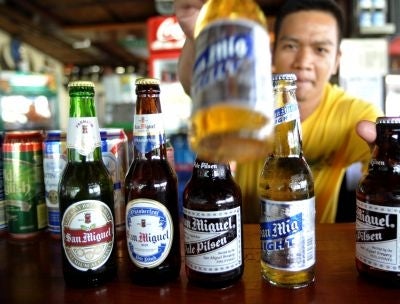Your support helps us to tell the story
From reproductive rights to climate change to Big Tech, The Independent is on the ground when the story is developing. Whether it's investigating the financials of Elon Musk's pro-Trump PAC or producing our latest documentary, 'The A Word', which shines a light on the American women fighting for reproductive rights, we know how important it is to parse out the facts from the messaging.
At such a critical moment in US history, we need reporters on the ground. Your donation allows us to keep sending journalists to speak to both sides of the story.
The Independent is trusted by Americans across the entire political spectrum. And unlike many other quality news outlets, we choose not to lock Americans out of our reporting and analysis with paywalls. We believe quality journalism should be available to everyone, paid for by those who can afford it.
Your support makes all the difference.The names Kirin, Asahi, Sapporo and Suntory may be known to beer connoisseurs around the world, but they have failed to make the leap to globally recognized brands that can be found in every bar from Shanghai to Sydney and Santiago.
But with the domestic market contracting, Japan's four major brewers have concluded that they need to have a far higher international profile if they want to compete with the companies behind such global labels as Heineken, Carlsberg or Budweiser.
While Asahi Breweries is Japan's largest domestic beer maker, it has a mere 2 percent of the world market. Anheuser Busch, on the other hand, has a 20 percent share.
Asahi Breweries' holding company has launched an effort to acquire Independent Liquor, a New Zealand-based manufacturer and distributor of beer and other alcoholic drinks with a solid business across Oceania and the Pacific. Suntory Holdings, the third-largest of Japan's brewers, has similar designs on the company for the same reason.
Total domestic shipments of beer and reduced-malt beers - which are cheaper as they benefit from lower government taxes - fell 2.8 percent from the previous year. The 459.17 million cases that were shipped was a record low for the sixth straight year since comparable records were first kept in 1992.
Analysts blame the gradual decline in beer consumption in Japan on an aging population and weak demand among younger consumers, who have less money to spend on going out and a far wider array of drinking options than previous generations.
Beer firms have been aware of these trends for several years and had set their sights on the burgeoning Chinese market, which became the world's largest consumer of beer in 2003. They have been unable to make the inroads into the market they anticipated, however, because of the relatively high price of Japanese beers and stiff competition from state-owned Chinese breweries.
Oceania may have fewer drinkers, but the market is stable and ripe for the introduction of new labels, Japan's brewers believe. Another advantage is that it has been relatively overlooked by the international brewing firms because of its geographical isolation from Europe and, to a lesser extent, North America.
Cracking this market may well give Japanese beer manufacturers an increased profile in South-East Asia and a number of South American markets.
And before long, the brewers here hope, it will be as natural to order an ice-cold Kirin in London, New York or Cape Town as it is to request the local tipple.
JR

Join our commenting forum
Join thought-provoking conversations, follow other Independent readers and see their replies
Comments